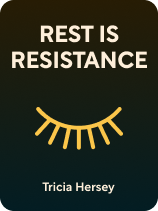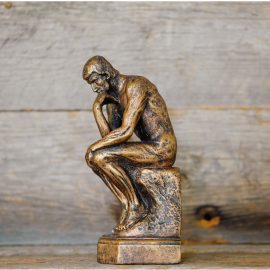

This article is an excerpt from the Shortform book guide to "Rest Is Resistance" by Tricia Hersey. Shortform has the world's best summaries and analyses of books you should be reading.
Like this article? Sign up for a free trial here.
Is rest more than just a break from work? Can taking time to relax actually be a way to fight back?
Tricia Hersey advocates rest as a form of resistance. She challenges the beliefs of a society focused on constant productivity, arguing that rest is a way to heal from the damage of grind culture and imagine a better future.
Keep reading to discover how rest can be a powerful tool for both personal and social change.
Rest as a Form of Resistance
Hersey frames rest as a form of resistance against grind culture. This is because rest isn’t just self-care; it’s also a challenge to the dehumanizing beliefs and practices of a society that values productivity above all else.
We’ll discuss how resting helps you to heal from the damage that grind culture inflicts on your body and your spirit. We’ll also explore how rest makes it possible to imagine and fight for a better future.
Resting Enables Healing
Hersey says that, through rest, people can begin to heal from the harm inflicted by grind culture. While resting, your body and mind engage in crucial processes that support your overall well-being. Rest is vital for physical health because it promotes healing, supports the immune system, and restores the body’s strength.
(Shortform note: Rest doesn’t just allow you to heal from overwork, it’s a chance for your body to become even stronger than before. This is the same principle by which athletes build their strength, speed, and endurance: They don’t see those benefits during a workout, but rather when their muscles heal from the damage that workout caused. On the other hand, athletes who don’t take enough time to rest and heal between workouts begin to suffer from severe pain and fatigue, as well as becoming more prone to injury and illness—instead of becoming stronger, they become weak and fragile as their bodies break down.)
Resting Is a Spiritual Practice
Hersey adds that rest isn’t just an act of physical rejuvenation, but also one of spiritual self-care.
She explains that grind culture wants to break your spirit—your innate sense of self-worth and purpose—in order to turn you into an obedient worker. If it succeeds, you’ll devote yourself to grind culture based on the false promises that you can fulfill those spiritual needs with money (value) and a job (purpose).
However, because grind culture is a direct attack on your spirit (or, as some would say, your soul), your spirit will naturally resist it. Resting when you need to is, therefore, a way to take care of yourself spiritually. In other words, rest is a refusal to allow grind culture to crush your spirit and an affirmation of your inherent right to simply exist without “proving” your value.
She adds that rest also provides you with opportunities for reflection, connection, and renewal. These are chances to heal your soul from the damage that grind culture has inflicted, and to strengthen your spirit so you can withstand future hardships.
| How Resting Is Spiritual To understand how resting can be a spiritual practice, it’s crucial to understand what Hersey means by spiritual and how spirituality differs from religion. Whereas religion’s main purpose is to form a connection with God or gods, often through prayers and rituals, spirituality has a much broader meaning. Spirituality can involve a connection with the divine, but it’s also a way to connect with the world and gain a deeper understanding of yourself. As such, spirituality is deeply personal, even when it’s expressed through communal gatherings and rituals that resemble organized religion. Black spirituality in particular emphasizes self-reflection and self-honor. This means regularly taking time to think about what you’ve done in the past, what you intend to do in the future, and who you are as a person. It also means being compassionate with yourself and being honest about what you need. In this case, Hersey is saying that you often need rest, and therefore you can honor yourself by taking that rest. |
Resting Allows You to Dream
In addition to the personal benefits of rest, Hersey also highlights its strategic importance in the ongoing fight for social progress. She explains that resting helps you to reclaim your ability to dream—both in the literal sense of having dreams while you’re asleep and in the sense of having daydreams or hopeful imaginings.
By allowing yourself to rest, you create opportunities for your mind to wander, imagine new possibilities, and envision alternative futures. This imaginative process is crucial for challenging the toxic status quo. This is because, before people can fight for change, they have to be able to picture the society they’re fighting to create.
(Shortform note: Dreaming like Hersey describes here doesn’t just give you a clearer idea of what you’re fighting for; the process of setting and pursuing meaningful goals boosts your well-being in and of itself. This means that—even if the world you imagine doesn’t come about in your lifetime—dreaming of that world and fighting to make it real will still make you happier and healthier.)

———End of Preview———
Like what you just read? Read the rest of the world's best book summary and analysis of Tricia Hersey's "Rest Is Resistance" at Shortform.
Here's what you'll find in our full Rest Is Resistance summary:
- How modern grind culture hurts you physically and spiritually
- The 3 myths that grind culture instill in society
- How rest can be used as a radical form of resistance






